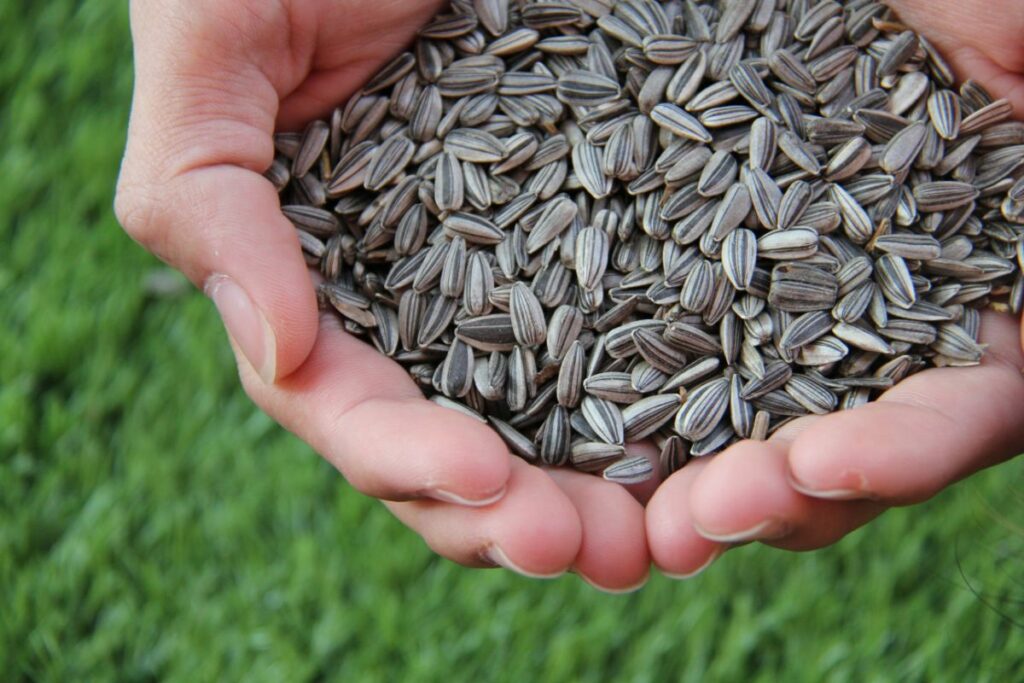Sunflower seeds are very popular health foods. They are commonly consumed in breakfast cereals, trail mix, or straight from the bag!
They are notorious for being very moreish, and once you’ve dipped your hand into the bag once, you’ll certainly be going back for more!
Sunflower seeds contain many different beneficial nutrients, including healthy minerals, fats, and antioxidant compounds.
It is a very common misconception that sunflower seeds count as legumes. We’re here to clear up any confusion on this matter!
Read on for an ultimate guide to both sunflower seeds and legumes. Let’s dive in!
What Are Sunflower Seeds?
Technically, sunflower seeds are the fruits of a sunflower plant. These seeds are taken from the large flower head of a sunflower.
A single sunflower can contain up to 2000 sunflower seeds.
Sunflowers are grown for two different reasons, one being the seeds that you can eat. The other reason for sunflower crops is the sunflower oil that they produce.
Sunflower seeds are harvested with a black and white shell that you cannot eat.
The edible part of the sunflower seed has a very mild flavor that is quite nutty. Often, sunflower seeds are roasted to bring out the flavors.
Are Sunflower Seeds Considered Nuts Or Legumes?
Sunflower seeds are not considered to be a nut or a legume. The sunflower seed is technically considered to be the fruit of a sunflower.
What Is A Legume?
Legumes are part of the Leguminosae family. The word is often used interchangeably with pulses, but legumes are slightly different.
They refer to the entire plant, including the pods, leaves, and stamps.
When we refer to pulses, we are just talking about the edible seed. Edamame beans, lentils, soy nuts, and black-eyed peas are also examples of pulses.
Legumes are a very popular part of the Mediterranean diet. While they are eaten in Europe and other parts of the world, they are consumed in smaller quantities.
Are Sunflower Seeds Similar To Legumes?
There are many similarities between legumes and sunflower seeds, mostly in the health benefits that they provide.
Health Benefits Of Sunflower Seeds
Sunflower seeds have many great health benefits.
Rich In Nutrients
Sunflower seeds contain lots of important nutrients. They are particularly high in vitamin E and selenium.
These nutrients play a key role in lots of chronic illnesses as they function as antioxidants that protect your cells against any damage.
Reduces Inflammation
Inflammation is often a risk factor associated with lots of chronic diseases.
Sunflower seeds lower levels of a particular C-reactive protein which in turn lowers the risk of heart disease and type 2 diabetes.
There are also some flavonoids in sunflower seeds that help to reduce inflammation, too.
Prevents Heart Disease
Sunflower seeds contain a compound that helps to lower your blood pressure. As well as this, the magnesium that the seeds contain helps to reduce blood pressure.
Sunflower seeds are also rich in fatty acids which promote lower blood pressure and lower cholesterol levels.
Lower Risk Of Diabetes
Sunflower seeds are thought to lower the risk of developing type 2 diabetes.
While more research is needed in this area, research suggests that eating sunflower seeds as part of a healthy diet can reduce the risks by 10%.
This is thought to be due to the plant compound chlorogenic acid which helps to decrease the effect of carbs on your blood sugar levels.
Health Benefits Of Legumes
Legumes also have many great health benefits, many of which are very similar to the health benefits of sunflower seeds.
Provide Key Nutrients
Like sunflower seeds, legumes provide great nutrients.
They are very high in fiber and they are low in calories. They also contain iron, calcium, potassium, and many other nutrients.
Rich In Antioxidants
Legumes are also rich in antioxidants. This can prevent cell damage and the antioxidants can also lower your risk of lots of diseases.

You will have a lower chance of developing cancer or cardiovascular disease if you follow a diet that is rich in antioxidants.
Promote A Healthy Heart
Beans and lentils are a great way to promote heart health. It is important to limit your intake of red meat for heart health as these meats are very high in saturated fat.
Adding lentils and beans to your diet is a great substitute for this as they help to lower blood pressure and inflammation which can lead to cardiovascular problems.
May Lower The Risk Of Diabetes
Like sunflower seeds, legumes are great for lowering the risk of developing type 2 diabetes.
Regular consumption of legumes has been associated with a lower risk of diabetes among adults.
Protein
Legumes are a great source of protein. They can be used in place of meat for this reason.
If you follow a vegetarian diet or a vegan diet, you will see many different health benefits, and adding protein to your diet through legumes will promote these benefits.
Can You Have An Allergic Reaction To Sunflower Seeds?
Many people confuse sunflower seeds with other types of nuts. While they are not nuts, this does not mean that you can’t have a reaction to sunflower seeds.
Allergies to sunflower seeds are fairly uncommon, but there have been some cases reported.
Reactions to sunflower seeds include mouth swelling, itching of the mouth, skin rashes, and vomiting.
If you have an allergy to sunflower seeds, you are likely to be having an allergic reaction to the various proteins in the seeds.
If you have these allergies, it is unlikely that you will have an allergic reaction to sunflower oil as the allergenic proteins are not present.
Some people are allergic to sunflower seeds simply by touching the seeds. This can result in itchy and inflamed hands where you have handled the seeds.
If you experience an allergic reaction to sunflower seeds, seek medical attention immediately.
Allergic reactions can be very dangerous and they should be taken seriously to prevent any damage or harm.
Can You Have An Allergic Reaction To Legumes?
You can have an allergic reaction to legumes. Food allergy occurs when your immune system considers a food to be a threat and responds.
If you are allergic to legumes you may experience a rash, swelling of the lips, or stomach pain.
In more serious cases, you may experience swelling in the throat, difficulty swallowing, and dizziness.
If you experience any of these symptoms, seek medical attention immediately! Even if you have eaten legumes before, you may still be experiencing an allergic reaction and you must seek help as soon as possible.
Final Thoughts
So, there you have it! Sunflower seeds do not count as legumes but they do contain some of the same health benefits.
They are both great to add to your diet to ensure that you are eating a well-balanced, healthy diet.
If you’ve been wondering whether sunflower seeds count as a legume, you’ve got your answer!
We hope you’ve found everything you need in this ultimate guide to sunflower seeds and legumes.








